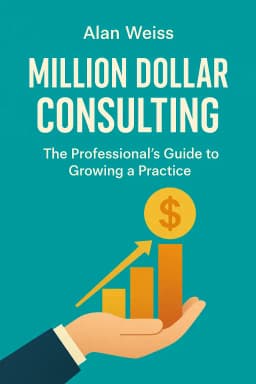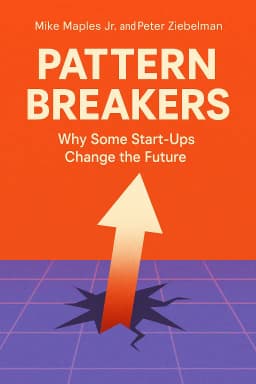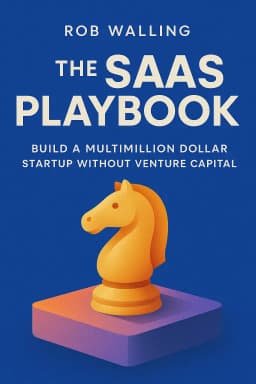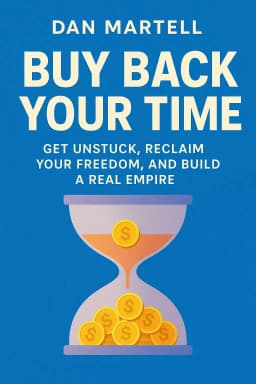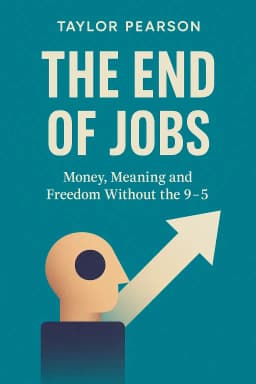
The Job Security Illusion
Money, Meaning and Freedom Without the 9–5
Golden Hook & Introduction
SECTION
Mark: Your 'safe' 9-to-5 job might be the riskiest career bet you can make. Today, we're exploring a book that argues the most secure path to wealth and freedom is the one everyone tells you to avoid: starting your own thing. The rules have completely changed. Michelle: I love that framing. It’s so counterintuitive. We're all taught to climb the ladder, get the stable job with benefits. But this book basically says that ladder is on fire. Mark: It’s a powerful argument. We're diving into The End of Jobs: Money, Meaning and Freedom Without the 9–5 by Taylor Pearson. Michelle: And Pearson is a fascinating guy to write this. He's not some tenured economist; he's a history major who became an entrepreneur and digital nomad after graduating right into the 2008 financial crisis. He saw this shift firsthand, living it. Mark: Exactly. And that perspective clearly resonated. The book was a massive bestseller and named a top business book of the year by Inc. Magazine, because it captured a feeling so many people, especially millennials, were having. Michelle: Okay, but "The End of Jobs" is a bold title. Is he really saying jobs are just… disappearing? Because I still see a lot of people going to work every day.
The Great Unraveling: Why the 'Safe' Job is an Illusion
SECTION
Mark: That's the perfect question to start with. He’s not arguing that jobs will vanish tomorrow. He’s arguing that the idea of a job as a safe, long-term path to prosperity is ending. The security is an illusion. He uses this brilliant, and frankly terrifying, analogy from the writer Nassim Taleb called the 'Turkey Problem'. Michelle: The Turkey Problem? I'm intrigued. This sounds like a Thanksgiving dinner gone wrong. Mark: It is, for the turkey at least. Imagine a turkey, living on a farm. Every single day for a thousand days, the farmer comes out and feeds him. From the turkey's perspective, the evidence is overwhelming: farmers love turkeys. His confidence in the farmer's goodwill grows with each passing day. The system is stable, predictable, safe. Michelle: I see where this is going. And it’s not good for the turkey. Mark: Not at all. His confidence is at its absolute peak on the day before Thanksgiving. And then, the very system that nurtured him, that he trusted completely, leads to his demise. Pearson argues that many people in 'safe' corporate jobs are living the turkey's life. They see the steady paycheck, the annual review, the 3% cost-of-living raise as proof of their security. Michelle: That turkey story gives me chills. It's the perfect metaphor for corporate life. You think the daily feeding is a sign of love, but it's just fattening you up for the inevitable restructuring or outsourcing. Mark: Precisely. Pearson calls this 'silent risk.' It’s the risk you don’t see accumulating. He tells the story of his college friends, like Max, an accountant who works sixty-hour weeks for a tiny raise, or Julian, a lawyer buried in student debt. They're following the rules, but they live in constant fear. He contrasts this with a group of entrepreneurs he met in a bar in Bangkok. Michelle: The Dubliner Bar entrepreneurs. I remember that from the book. Mark: Yes. These were people who, on the surface, looked like they were taking huge risks. They were running software companies, e-commerce stores, and travel gear businesses from their laptops. Two years later, he revisits them. Their businesses had exploded. The conference they attended grew by 400%. One of them, Dan Norris, had launched a company called WP Curve that was on track for high six-figure revenues. They had freedom, they were building assets, and they were in control. Michelle: So they had visible risk, which they could manage, while the friend in the 'safe' job had silent risk, which was completely out of his control. But what's causing this? Why is the farmer suddenly sharpening his knife for the corporate turkey? Mark: Pearson points to three massive, interconnected forces. First, Globalization. There are now billions of educated, ambitious people around the world who can do knowledge work for a fraction of the cost. Second, Technology. Software is, as he says, "eating the world." Automation isn't just for factory floors anymore; it's coming for white-collar, knowledge-based jobs. Michelle: And the third one is the one that hits close to home for a lot of us. Mark: It is. He calls it the Commoditization of Credentialism. A college degree used to be a golden ticket. Now, it's just the price of admission for an entry-level job that might not even pay enough to cover the student loans you took out to get it. The book cites this staggering statistic: between 2000 and 2010, the number of college graduates globally jumped from 90 million to 130 million. The supply of 'qualified' people is skyrocketing, which drives down the value of the credential itself. Michelle: Wow. So the very things we were told would make us safe—our degrees, our loyalty to a company—are becoming the sources of our insecurity. That’s a sobering thought. Mark: It is. But it’s also the setup for the most hopeful part of the book. Because the same forces causing this unraveling are also creating an unprecedented opportunity.
The New Leverage: How Entrepreneurship Became Safer and More Profitable
SECTION
Michelle: Okay, so the same technology that lets a company outsource Max's accounting job to the Philippines must also be creating opportunities, right? It can't all be doom and gloom. Mark: Exactly. This is what Pearson calls the 'Great Inversion.' The walls that used to protect large corporations—the high cost of manufacturing, the control over distribution, the massive marketing budgets—have crumbled. And now, those same tools are in the hands of individuals. He explains this through a concept called the Long Tail. Michelle: Right, the idea that you don't need a blockbuster hit to be successful anymore. Mark: Precisely. The perfect story to illustrate this is the creation of CD Baby. In the late 90s, a musician named Derek Sivers just wanted to sell his own CD online. There was no easy way to do it. So he built a simple website. Then his friends asked him to sell their CDs. And it just grew from there. Michelle: He wasn't trying to build a giant company. He was just solving his own problem. Mark: And in doing so, he unlocked the Long Tail for thousands of musicians. The book tells this amazing little story about one artist on CD Baby. She made music exclusively for sailors. Michelle: Music for sailors? That is incredibly niche. A major record label would have laughed her out of the room. Mark: They would have. In the old world, a physical record store in, say, Ohio, couldn't justify stocking her CD. There aren't enough sailors in Ohio to make it worthwhile. But online, geography is irrelevant. She could reach every sailor on the planet with an internet connection. And she ended up making a full-time living selling her music. Michelle: So, basically, 20 years ago, you had to sell a million CDs to be a success. Now, you can be a success by selling a thousand CDs to a thousand die-hard sailor fans who could never find you before. Mark: You've got it. And this applies to everything, not just music. The book is full of examples. Jimmy and Doug from Minaal wanted to create the perfect travel backpack for entrepreneurs. They didn't need a factory. They found one of the best bag factories in the world online, got prototypes made, and then pre-sold the product on Kickstarter to fund the first production run. They had zero upfront capital risk. Michelle: That’s incredible. They’re acting like a massive corporation, but it’s just two guys with a laptop and an idea. Mark: This is the democratization of both production and distribution. You can use software-as-a-service tools for everything from accounting to customer support for a low monthly fee. You can hire world-class talent for specific projects on marketplaces like Upwork. You can educate yourself on almost any topic for free or for a tiny fraction of a university degree. The barriers to entry have been obliterated. Michelle: This is starting to sound like more than just a financial calculation. It feels like a different way of living.
The Entrepreneurial Mindset: Redefining Money, Meaning, and Freedom
SECTION
Mark: It absolutely is. And that's the final, and I think most profound, part of the book. It's about the 'why.' Why do this? Pearson introduces what he calls the 'Tom Sawyer Effect.' Michelle: From the Mark Twain novel? The kid who has to paint a fence? Mark: The very same. Tom is given the chore of whitewashing a fence, and he hates it. It's work. It's an obligation. But then he has a stroke of genius. He starts painting with intense focus and artistry, pretending it's the most amazing, exclusive activity in the world. Soon, all his friends are begging him for a turn. They're even paying him for the privilege of doing his chore. Michelle: He turned work into play. Mark: He turned an obligation into a choice. And that's the core of it. Pearson argues that humans don't hate work; we hate obligation. We are wired to strive, to solve problems, to create. The problem with the traditional job model is that it frames work as a disutility—something you endure for 40 hours a week in exchange for money so you can live your 'real life' on the weekend. Michelle: That’s a powerful distinction. And it leads to that idea of the 'slow lane' versus the 'fast lane.' Mark: Yes, from MJ Demarco's book The Millionaire Fastlane. The slow lane is the job: you trade your time for money. Your income is capped by the hours you can work. It's a linear path. The fast lane is entrepreneurship: you build systems and assets that work for you. Your income isn't tied to your time; it's tied to the value you create, and that has unlimited leverage. Michelle: And that's where the story of the Lamborghini comes in. Mark: It is. Demarco, as a teenager, sees a young guy driving a Lamborghini and can't figure it out. He doesn't look like a doctor or a CEO. So he runs up and asks him, "What do you do for a living?" And the guy just says, "I'm an inventor." That one word changes Demarco's entire worldview. He realized wealth wasn't about getting a job; it was about creating something. Michelle: Wow. So the argument isn't just 'quit your job to get rich.' It's 'quit your job to feel alive.' It's about reclaiming freedom and meaning, which, paradoxically, makes you more likely to get rich. But let's be real, the book has been criticized for being a bit too optimistic. It makes entrepreneurship sound like this golden path, but most startups fail. How does Pearson address the very real risk of falling flat on your face? Mark: That's a fair and crucial critique. He addresses it by shifting the definition of risk. He argues we should think like a professional poker player, using a concept called 'Expected Value'. A poker pro knows they'll lose individual hands. That's part of the game. But they consistently make bets where the potential reward, multiplied by the probability of winning, is greater than the potential loss. Over time, they come out ahead. Michelle: So a job is like making one single, huge bet on that turkey farmer being nice forever. Mark: Exactly. It has a massive, hidden downside. Entrepreneurship, in the way Pearson describes it with the 'Stair Step Method' or apprenticeships, is about making a series of smaller, smarter bets. You start a small side project. You learn a new skill. Maybe it fails, but you've lost very little money and gained a ton of experience. Your 'expected value' for the next bet goes up. The systematic pursuit of these positive-value opportunities is, he argues, far safer in the long run than betting your entire life on a single employer who feels no loyalty to you.
Synthesis & Takeaways
SECTION
Michelle: It really reframes the whole idea of a career. It’s not about finding a safe harbor anymore. It's about learning how to navigate the open ocean. Mark: That's a perfect way to put it. The world of work is no longer Mediocristan—that safe, predictable bell curve. It's Extremistan, a place of volatility and unpredictable, high-impact events. You can either be the turkey, surprised by the sudden shock, or you can be the artisan, who faces small, daily volatilities and becomes stronger and more adaptable because of them. Michelle: The book is a call to become antifragile, to use a term from Taleb that Pearson loves. To gain from disorder. Mark: The core message isn't to gamble everything on one crazy idea. It's to start seeing the world differently. To ask, 'How do I create a job doing that?' instead of 'How do I get a job doing that?' It’s a shift from being a consumer of options to a designer of realities. Michelle: It really leaves me with a big question, and I think it's one for our listeners too. What's the one small, 'safe but feels risky' step you could take this week? Not quitting your job tomorrow, but maybe buying that domain name you've been thinking about, or taking that online course in a skill you're curious about. Mark: That's the perfect question. The first step on the staircase. We'd love to hear your thoughts. Find us on our socials and share that one small step you're considering. It’s about moving from indefinite optimism—a vague feeling that things will be better—to definite optimism: having a plan, even a small one, to make it so. Michelle: This is Aibrary, signing off.

